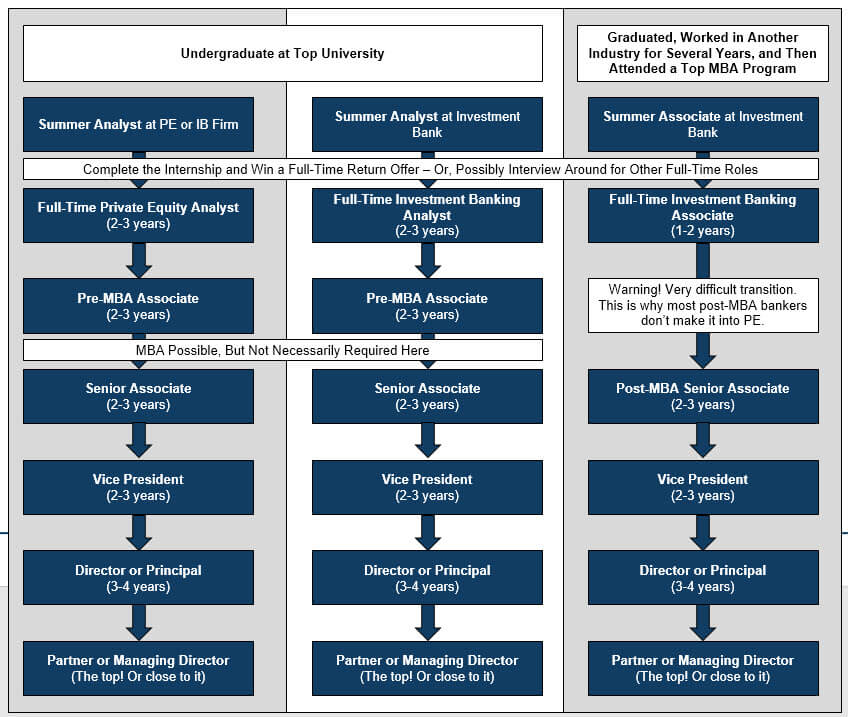Join 307,012+ Monthly Readers
Join 307,012+ Monthly Readers
Free Banker BlueprintPrivate Equity Careers
An Overview of What A Career In Private Equity Is Like, Including Career Path, Salaries, Lifestyle and Work Product
Why A Career In Private Equity?
If you got the “Why private equity?” question in an interview, you’d probably say that you love investing and operations, and you want to build value for companies over the long term.
But in real life, most people are drawn to private equity because it offers high compensation, somewhat better hours than investment banking, and more interesting work.
Some people also enjoy the excitement of working on large deals and interacting with “the best and brightest,” as well as understanding company operations in more depth.
In this article we’ll explore what it’s really like in a career in private equity.
Private Equity Career Topics
What Do You Actually Do In A Private Equity Job?
Private equity firms raise capital from outside investors, called Limited Partners (LP), and then use this capital to buy companies, operate and improve them, and then sell them to realize a return on their investment.
The industry is called “private” equity because the companies that private equity firms invest in are private initially, or become private as a result of the investment.
The job is part fundraising, part operational management, and part investing.

Private Equity Skills and Job Requirements
The private equity career path attracts people who are:
- Competitive, high achievers who are willing to work long, grinding hours.
- Extremely attentive to detail.
- Interested in deals rather than simply following the markets or investing in public companies or other assets.
- Interested in investing and operations and using critical thinking to evaluate companies rather than selling or being an agent.
- Interested in long-term projects such as building a portfolio company over many years, and are also open to non-deal work, such as company monitoring and fundraising.

The Private Equity Career Path
The private equity career path and hierarchy vary from firm to firm, but here’s a representative example:
- Private Equity Analyst – Logistical Monkey
- Associate (Pre-MBA) – Deal and Analytical Monkey
- Senior Associate – More Experienced Monkey
- Vice President – Manager of Deals
- Director or Principal – Generator and Negotiator of Deals
- Managing Director or Partner – Rainmaker, Fundraiser, and Chief Representative.
And here’s a flow-chart summary:

Unlike other industries such as investment banking, where professionals will typically pursue “Exit Opportunities” into other fields, Private Equity is often seen as an exit opportunity.

Salaries and Promotion Timeframes In Private Equity
Private equity professionals earn well – especially at the upper echelons. Here’s a summary of what to expect at each level in a front-office role at a big firm in North America (pay will typically be lower in other countries):
| Position Title | Typical Age Range | Base Salary + Bonus (USD) | Carry | Time for Promotion to Next Level |
|---|---|---|---|---|
| Analyst | 22-25 | $100-$150K | Unlikely | 2-3 years |
| Associate | 24-28 | $150-$300K | Unlikely | 2-3 years |
| Senior Associate | 26-32 | $250-$400K | Small | 2-3 years |
| Vice President (VP) | 30-35 | $350-$500K | Growing | 3-4 years |
| Director or Principal | 33-39 | $500-$800K | Large | 3-4 years |
| Managing Director (MD) or Partner | 36+ | $700-$2M | Very Large | N/A |
For more details, see our article on private equity salaries, bonuses, and carried interest (carry).

How to Get a Job in Private Equity
To get into private equity, you’ll need:
- A sequence of highly relevant work experience, including transactions and financial modeling.
- Top academic credentials (grades, test scores, and university reputation);
- A lot of networking and interview preparation;
- Something “interesting” that makes you appear to be a human rather than a robot;
- The ability to think critically about companies and investments rather than just “selling” them.
- A strong cultural fit with the firm – PE firms are much smaller than banks, so “fit” and soft skills are even more important.
For more, see our comprehensive guide on How To Get Into Private Equity.

Private Equity Career Training
Private equity is a highly competitive and sought-after field. PE firms are small, tight-knit, and full of extremely smart and highly motivated people.
As a starting point, the right career background is critical. Overwhelmingly, PE firms hire people with experience working for top investment banks, and sometimes those with consulting, Big 4 transaction services, or related deal/valuation experience (e.g., corporate development at a normal company).
That said, firms expect new hires to hit the ground running with usable skills. And if you want to be competitive in interviews, you need to be well-versed in explaining your deal/client experience and answering technical questions and case studies.
Some of the courses offered by Mergers & Inquisitions and Breaking Into Wall Street that will help you win private equity roles include:
- Investment Banking Interview Guide – Includes a 120-page guide to LBO modeling and 4 practice LBO case studies/modeling tests
- BIWS Premium – This course includes more in-depth LBO case studies and coverage of foundational financial modeling skills
- Advanced Financial Modeling – This features our most advanced LBO model (stub periods, dividend recap, OID, working capital adjustments, etc.) and an open-ended, “take home” private equity case study
- Venture Capital & Growth Equity Modeling – This one is highly relevant for roles investing in earlier-stage companies, where knowledge of cap tables and granular financial models is essential
Completing these courses will help you win interviews and job offers for roles that pay $150K+ and position you for careers in private equity.









